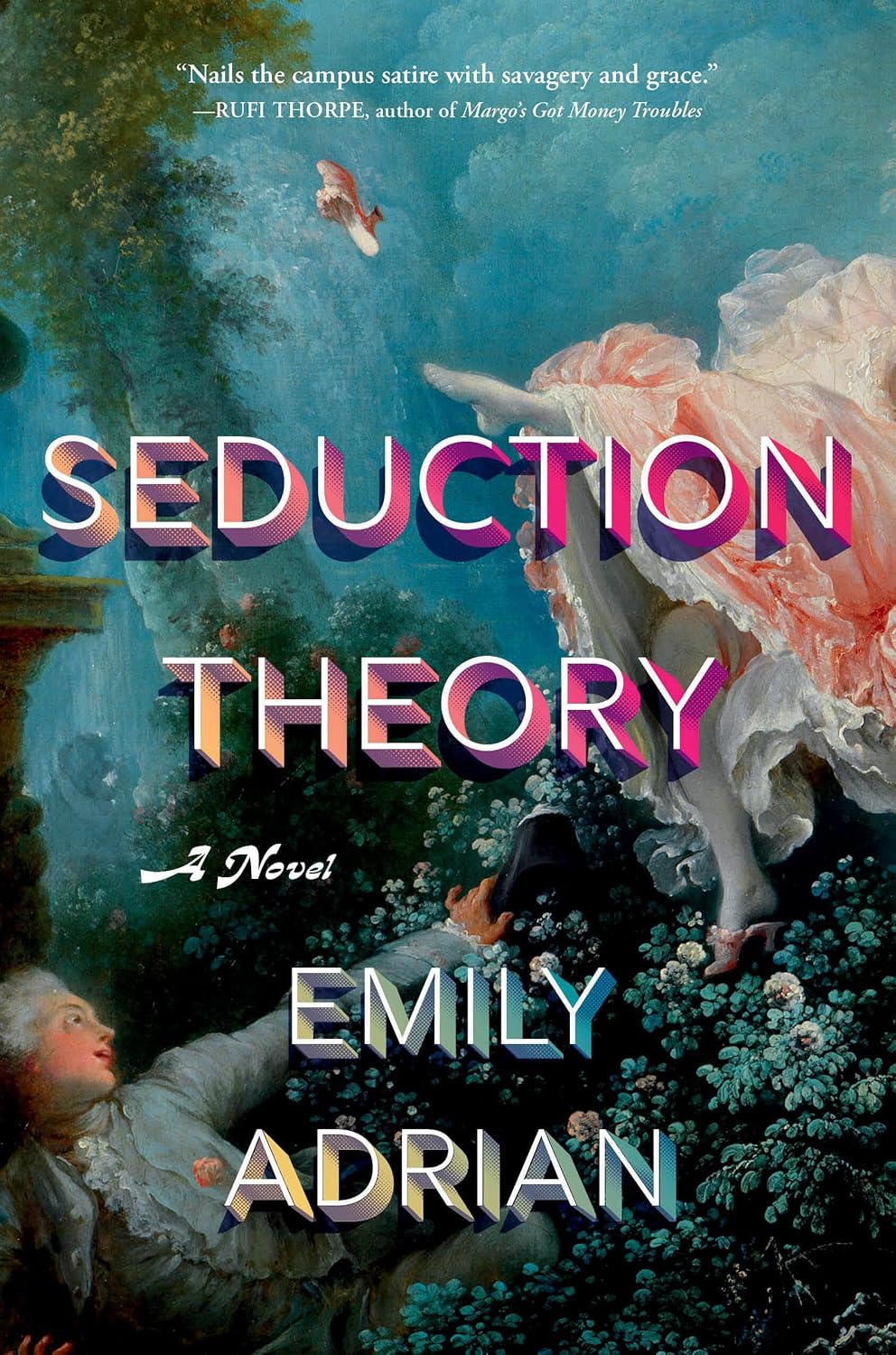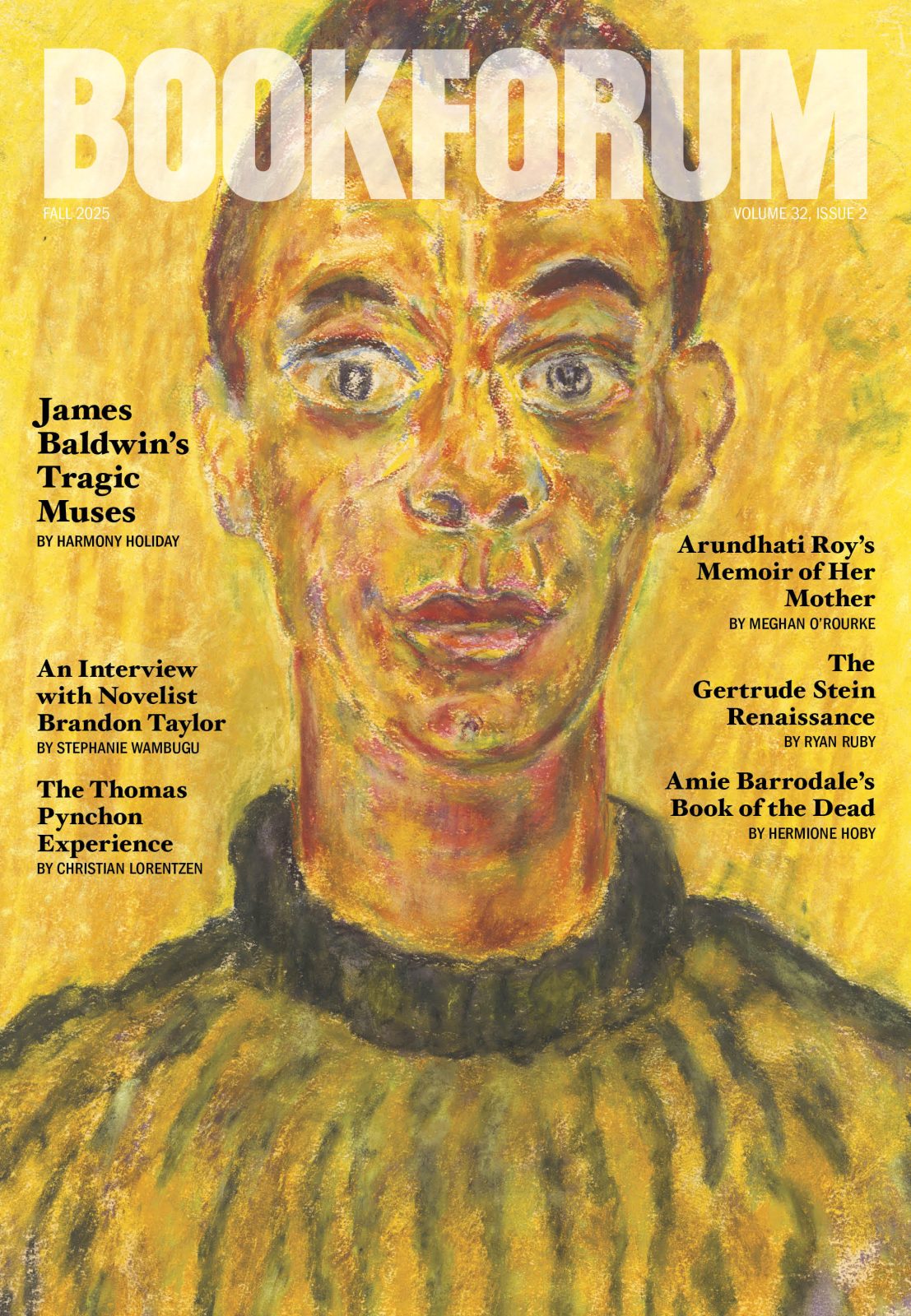
THERE IS VERY LITTLE CHANCE that I can be convinced academia is sexy, but I could be persuaded to think it’s funny. From a distance I have gleaned campuses to be tiny fiefdoms in which everyone takes turns believing that they are in charge, or should be, or will be soon. This is great material for comedy.
And yet, regardless of genre, narratives set in educational institutions so often concern themselves instead with who’s fucking and why. Perhaps writers trust that the satire of such self-serious spaces will come through without much effort and are wise to focus instead on the intertwining machinations of desires and vocations. That is the case with Emily Adrian’s Seduction Theory,her novel set inside the novel that is the MFA thesis of her narrator, Robbie, a grad student similarly twisted up inside the death grip of a crush on her favorite professor, Simone.
Simone is a successful and widely acclaimed woman who can be summed up with the three B’s that matter most to Robbie: beautiful, brilliant, and best-selling. She wrote a memoir about the tragic death of her mother that earned her a tenured position at Edwards University, described as “the country’s sixth best fully funded MFA program.” Her handsome husband, Ethan, is a spousal hire in the same department, the novel he long ago published about Simone’s grief over the death of her mother his main proof of ambition and artistry. For the first time in what is repeatedly described as a sexually passionate and emotionally codependent marriage, they have decided to spend part of the summer away from each other. Ethan travels to his mother’s house, and Simone stays to train for a marathon, among other pursuits.
Ethan has a colleague named Abigail. She is not his secretary but so often uses the title “in wry subversion of the school’s progressive values” that now Ethan can’t think of her as anything else when he thinks of her, which is more than he thinks he should.
I’m sure you can see where this is going. So can Ethan, who recognizes right away, after one shared cigarette at a department party, that their “affair was predestined, inevitable.” Affair is a bit of a stretch (they sleep together once, and he says something rude to her about his wife as a pretense to intimacy), but the exaggeration is the point; he doesn’t seem like the kind of man who can bear an indiscretion unless it is made with some real gravitas.
The other person who can see where this is going is Robbie, who has made it her practice to stay attached to Simone. Simone seems to be cultivating the same—asking Robbie to join her in training for the marathon, casually dropping hints about her sexual proclivities, inviting her to sleep over. These are all reasonably plausible tests of the rules that American universities set against an easily toxic dynamic, one that flourishes in the subtle differences between generational divides and power imbalances traded back and forth. But there are also other indiscretions that are less clear. After their long, sweaty runs, Simone allows Robbie to use her shower, and then, suddenly though perhaps calculatingly, steps in under the water with her. When Simone casually says Robbie can spend the night, she is suggesting they sleep in bed together, of course; they are too mature for such conventions as crashing on a couch. These are maddeningly confusing shows of chastity: in their supposed maturity, they challenge any observer (like, say, Robbie) to risk being humiliated just for pointing out the obviously seductive subtext. But it is not love or sex that Robbie wants. It’s the satisfaction of knowing she could, maybe, have what she wants, if she proves herself to have enough of what she believes she must: vicious intelligence, reckless aspirations, ruthless lust. These are the standards she is young enough to believe are universal when they are simply the by-product of a too-small universe. Simone’s commitment to her husband is supposedly total; in one very funny moment of reflection (as described by Robbie, who has her own reasons to ascribe ulterior motives to Simone’s behavior), we listen to Simone think about how her habit of flirting with other men is only proof of her devotion. After all, she could have anyone she wants, and she continues to choose Ethan. Still, she is aware that her allegiance to monogamy requires her to come up against its edges and then choose to back away faultless. “What fun was fidelity,” writes Robbie in her asides that are the novel about her professor’s life story, “without a touch of exhibitionism?”
Robbie is there to oblige this surfacing desire for temptation and exhibitionism. She writes, she tells us, “the facts as I understand them,” though also admits to her inventions and fantasies as soon as she finishes indulging them: every time one of her daydreams gets away from her on the page, she admits as much, and the next paragraph reorients us to the story as she chooses to control it. Now Simone and Ethan are not a pair of forbidden desires, one to want and one to reject, but simply her characters. Robbie follows them as they attempt to drive away from the affair on a chaotic road trip and then follows them back to where they resume their roles in her life as a married couple whose approval she needs. If fidelity is only fun because of exhibitionism, then the actual third party in those relationships is alternately the fear or certainty of being seen.
Under Robbie’s gaze, her readers will learn more about her as a voyeur—she is a harsh editorializer of how other people appear, and yet a vague one. Simone’s beauty, frequently referenced though only shown as a shadow in references to her expensive clothes or comfort within her own nudity, is not there for the reader to wonder about. It is Robbie’s novel, and Robbie wants Simone; isn’t that enough to confirm Simone’s beauty, that Robbie has chosen to love looking at her? Similarly, Ethan is described as being awed at his ability to be attracted to Abigail, who is also supposed to be understood as plain from a sequence of facts that are as harsh as they are opaque. Abigail is a little messy, in appearance and behavior; but more than anything she is not Simone, and for Robbie that is enough to rate her as below desire. Robbie makes it a point to tell her reader that she is beautiful, too, in the careful language of “easy on the eyes” and in her boasts about how easily she can pick up other women when she wants.
Everything is easy for Robbie, it seems, including the belief that she can look into someone’s heart and know that what she sees is theirs rather than a reflection of hers. A friend of mine currently completing their training as a psychoanalyst once told me about a kind of shortcut for remembering definitions they needed to learn, and I am paraphrasing what they said for brevity: neurotics worry that everyone hates them, while psychotics know that everyone hates them. You can guess which one I think Robbie is.
But in Robbie’s novel inside Adrian’s novel, the tells that any author shows about themselves come through just as loud as if she were a real person. Robbie has an impetuousness for pursuing and capturing a good story, not caring or even considering if it’s hers to tell; she believes that observing amounts to listening. And for all her sexual prowess and supposed self-awareness, she is not quite ready to admit that maybe she just has a fetish for being graded. Some people like to hear “good girl” at certain moments of intimacy; Robbie probably would want to hear “brilliant thesis.” In Robbie’s first major interaction with Simone, a workshop of her own draft in class, Simone devastates her by suggesting that what her story needs is less of its writer. “‘A virtue with which every writer should acquaint herself,’ Simone went on, ‘is humility.’ She did not smile. My mortification at her hands was ecstasy.”
The observational distance of fiction is collapsed here, in that we are reading a writer do the work of telling the story. Adrian’s writing has a queasy integrity for the way certain people can perceive certain parts of themselves. These characters pride themselves on their intelligence and call it self-awareness, but most have only achieved a basic level of self-consciousness. (In one encounter with Simone, Robbie pauses before entering her office to consider the outfit she chose because she believed Simone would like it, smoothing her eyebrows. Down the hall, Robbie can hear Abigail complaining about her ex-husband. “One difference between a girl in her early twenties and a married woman who just turned forty,” Robbie thinks, “is I can recognize a crush when I have one.”)
Seduction Theory is the story of a sexual education for a group of people frozen in a preserved adolescence that confuses deference for loyalty, certainty for faith, applause for affection, and work for care. “Should it always be framed as a seduction?” Robbie asks Simone rhetorically on one of their runs, about the interaction between writer and reader, teacher and student. “Maybe it’s the grad student in me, but I think I want to be challenged more than seduced.” I can practically hear the world-weary sigh in the way Adrian writes Simone’s answer: “Robbie, they’re the same thing.”
Frequently the characters of the love triangle refer to their own story as one about marriage and all it encompasses—love, lust, disgust, boredom—but there is another kind of relational triangulation reluctantly hanging around, and it is the one between parent and child. Simone has spent so long defining herself as motherless and defined by her identity as an orphan that she has decided to never give up her status as a daughter. Simone, too, admits to herself that she sees all her grad students as orphans, and it follows that she would be confused as to whether she is expected to adopt them. A lifelong daughter does not have to understand the boundaries that separate a parent from a peer.
Mothers, whether their presence or absence or even the simple fact of their existence, are the most pivotal side characters in the book: Abigail is a single parent, and Simone loves Ethan’s mother, Lois, so much that she is an entire reason to consider forgiving Ethan’s infidelity. And Robbie, though she sneers at the admittedly saccharine insistence of universities treating their students like children or virgins, is not exactly a sexual or romantic threat to the marriage at the center of this novel: what she is resisting is being considered only as the result of those feelings, and not her own person. Like a child, she is looking for permission just to defy it. Like a child, she marvels at her adulthood. “I woke up wrecked like a new mother,” she tells us in describing the highest pitch of writing the manuscript. “Opening the laptop day after day, I realized it had happened: I was what I wanted to be when I grew up.” She eavesdrops on a pair of people with some amount of control over the circumstances of her life with a pitch so high she can believe herself to be a mind reader. The other tiny fiefdom defined by its similarly tragicomic struggles over who gets to be in charge is, of course, the family.
Haley Mlotek is the author of No Fault: A Memoir of Romance and Divorce (Viking, 2025).
